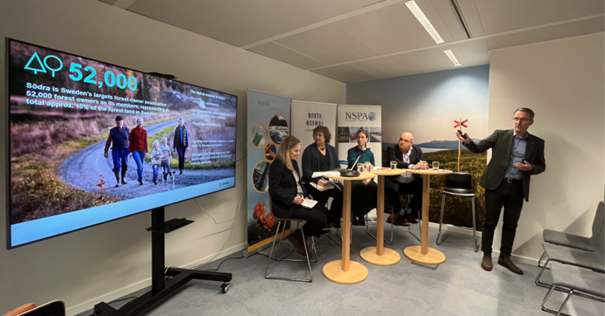The deforestation regulation, what’s next?

From the beginning of 2025 the new EU Deforestation Regulation will come into effect. Under the regulation, any operator or trader who places commodities from wood on the EU market, or exports from it, must prove that their products are “deforestation free”. The NSPA network in Brussels arranged a seminar to explore the regulation itself but also the potential challenges it may bring in its wake. How will businesses in the woody biomass sector be impacted, and what steps should they take to prepare for the evolving regulatory landscape?
– The Northern Sparsely Populated Areas network together represents some of the most forest rich regions in Europe. Our economies depend on forestry. It is a concern for us how this regulation will affect our strive in the arctic region for a circular, biobased economy, Carina Christiansen, Project Manager Bioeconomy at North Sweden European Office, stated in her opening remarks.
Carina Christiansen moderated the panel discussion that followed, where EU policy makers, experts and bioeconomy stakeholders from the North reflected on the possible implications of the regulation, in regard to woody biomass trade.

Forestry is not a global driver of deforestation
The Deforestation Regulation casts a wide net, encompassing a multitude of sectors and businesses. As it stands, the affected commodities are palm oil, soy, wood, cattle, cocoa, coffee, rubber, and various derived products. However, forestry per se is not the driver of deforestation, the change of land-use is. Sustainable and active forestry is on the opposite critical for is important for carbon capture and for producing renewables and therefor plays a central role in the climate efforts of the EU. Still, wood gets more heavily regulated.
Extensive due diligence will be mandated
Sara Nordin, with a background from Jämtland in northern Sweden, is a Partner at White & Case Lawfirm and specialises in trade compliance. Sara Nordin provided an overview of the regulation and the due diligence it mandates for companies.
Anyone who wants to put wood or products that are derived from wood including fuel wood, wood products, pulp, paper and printed books on the EU market, or export them from the EU, must prove that their products do not originate from deforested land or have contributed to forest degradation, as of December 30th 2024. The measures required include a due diligence statement, ensuring that their products adhere to local legislation and the collection of geolocation data, tracking the production location and date. If companies fail to comply, they risk facing dissuasive penalties.
Gordon Murray, Canada: Why can we not restore burned forest?
Gordon Murray, Executive Director of Wood Pellet Association of Canada, expressed concern about the definition of primary forest in the regulation, which states that forest that looks natural to the eye and have no major signs of human interference, is primary forest.
– This means that restoring forest that have been subject to forest fires or windstorms, which is a common issue in Canada, would not be allowed, Gordon Murray argued. The European export market is very important to us. But if it becomes too difficult to sell to the EU, we can find other markets, he continued.
Geolocation, a challenge for pulp industry and wood pellets industry
In the context of the forestry and wood sector, the geolocation requirements would mean that any tree harvested, and products derived from it, would have to be traced back to its original plot and time of harvesting.
It was made clear how exceedingly challenging it would be to implement throughout the value chain when several of the panellists as well as the audience raised the case of wood pellets and wood pulp.
Jonas Larsson, Head of Customer Supply Center Södra Cell International, Sweden's largest forest owner Assocation, reflected over the challenge in practical traceability through the process of producing pulp where the wood is mixed.
– We have good knowledge and system support in the Swedish forestry about individual harvesting sites, we know where our wood gets delivered from. But after that, the wood is mixed at several steps in the wood pulp process. The finished product of wood pulp could contain particles from countless plots of land and times of harvesting.
And even if geolocalisation would be technically possible, Jonas Larsson also raised the question of whether the geo localisation of wood actually is meaningful in the fight for global deforestation.
Could the regulation potentially breach EU competition laws?
The requirement to provide geolocation coordinates not only presents a challenge to the industry for technical reasons and but it may also entail potential breaches of EU competition laws. Companies rely heavily on their relationships with partners for competitive advantages and mutual interests. Hence, safeguarding the integrity of the information value chain is paramount to maintaining these essential business relationships.
– If companies need to share geolocalisation of their procurement areas, we are talking about sharing sensitive information, Maija Rantamäki, Manager of International and EU Forest Affairs from Finnish Forest Industries, argued.
Uncertainties remain on how the implementation of the Deforestation Regulation
Delphine Sallard, Senior Expert Trade and Environment at DG Trade of the European Commission, tried to give some answers to the concerns that were voiced by the knowledgeable panel and audience. However, a lot of the details and definitions remains to be provided from the European Commission.
Some questions and messages that were raised from the online and in-person audience, mainly aimed at the Commission.
- Will the regulation create two global markets? One that follow the bureaucracy and the administration of the regulation and one that China will run?
- What is the definition of negligible risk of negligible risk of non-compliance?
- Could the comprehensive regulatory frameworks, in fact counteract the EU’s climate ambitions of making the switch to more renewable materials?
- Is this part of the regulation fighting the global deforestation or could it in fact counteract the EU’s climate ambitions of making the switch to more renewable materials by placing a heavy administrative burden on the bioeconomy sector?
- How will small, family business-based landowners be able to keep up with the heavy administrative burden that the regulation would be placed on them? Surely, there is no room for them to hire lawyers and administrators to handle the impact of the regulation. In Sweden for example, there are 313 000 private landowners that owns about 40 hectares each that could suffer greatly from this regulation and in the long run risk being forced to sell their land to big corps.
- Will the deforestation regulation affect the competitiveness of EU?
- Trade in wood products should not be made more difficult at a time of climate and energy crisis where we all need to replace fossil materials with renewable ones.
- Several expressions in the regulation indicate that it would be wrong to plant trees, a stance which could severely counteract the main purpose of the regulation, i.e. growing more trees worldwide to capture and store carbon while at the same time providing habitats to animals and plants.
What’s next?
The timeline associated with this new regulation poses its own set of challenges. From when the regulation came into force in June 2023, companies have approximately 18 months to prepare, with a deadline set for the end of December 2024. Considerable work lies ahead. The European Commission is developing a national ranking system to categorize countries based on their deforestation status, the benchmarking system, which will be published in early 2024.
In addition, a review will be carried out over the course of the next two years, potentially adding more products to this list such as biofuels.
Find Europaforum Northern Sweden position paper on the European Commission’s proposal for the Deforestation Regulation here
Find the Deforestation Regulation here
Watch the recording of the event here
